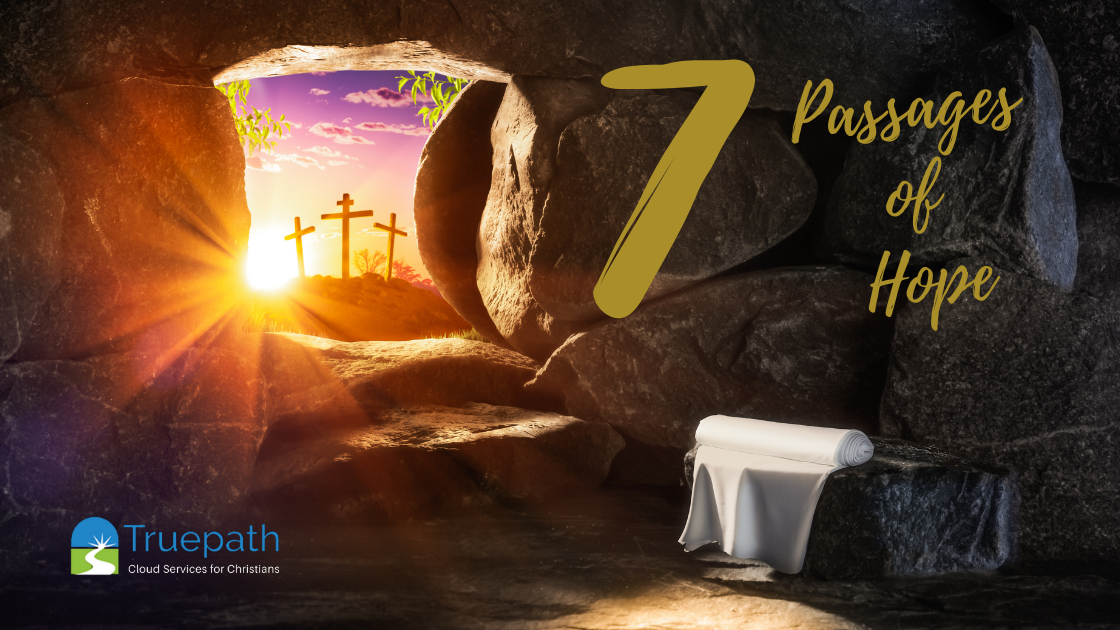Afterlife, after Easter
by Stephen Trout
It’s a misnomer, really, this thing we call “afterlife.”
As if this present age we’re living in is the real life, and what follows is necessarily something far less.
But is it?
If we accept that premise – as Ricky Gervais’ character Tony does in the fascinating series After Life – we may find ourselves justifying all kinds of things we didn’t expect in the here and now.
For example, after his wife dies, Tony seriously contemplates suicide as an option – but opts instead for bitterly living and punishing this world by saying and doing whatever he likes.
It sounds tragic – but why not, right? Who’s to say that shouldn’t be done, if there isn’t anything more and we all just disappear?
Not caring for himself or anybody else almost becomes like a superpower for Tony – a kind of artificial life that gives him purpose in his seemingly purposeless world.
But (as you might have guessed) that “life” doesn’t quite work out – at least the way Tony envisioned. Turns out, people don’t actually enjoy being so mistreated (surprise, surprise).
Again, we might say that Tony’s version of dealing with “after life” might sound extreme, but there’s a logic to it. Why not live how you want if we all end in despair eventually?
But that wasn’t Jesus’ story; and because it wasn’t, a revolution took place that changed the world.
Life… because of Easter
You don’t have to be a Christian to acknowledge the above statement about a world-changing revolution.
Respected historian Tom Holland isn’t (though he may be in process), and yet calls what happened after Christ’s resurrection, “the most disruptive, the most influential and the most enduring revolution in history.”
What Holland observes as world-changing has impacted everything – from our ideas of freedom, progress, equality, and much more.
Though we could discuss each of those in detail (read his book, or Glen Scrivener’s excellent The Air We Breathe), one thing that was especially powerful was how it reshaped our whole notion of after-life.
For Jesus, passing through that door was a truly death-shattering moment. After enduring the hell of separation from his Father on the cross, he punched a hole in the grave and walked victoriously through.
And when we see him soon after, his still-scarred hands have made a fire on the beach and are cooking some fish to feed his friends. Life giving life, as he always did.
This triumph over sin and death that we celebrate as Easter was actually a passage – not to some post-life nothingness – but to a new and better existence and physicality. So it will be for all who, by grace, follow in his train (Ps. 68:18, 2 Cor. 2:14).
So what does all this have to do with your vision of life – displayed on your website and through your everyday loving of others in ministry? Or to say it another way, what does life look like after Easter, in our here-and-now challenges and struggles?
For starters, I’d like to suggest that it tells us at least 2 things:
1. “afterlife” isn’t our real story.
Rather, we’ve been written into a new and far better story – one where the hopelessness and despair and death we see all around us (and that Tony felt) isn’t the final word.
Though we grieve those things – particularly when we see that life wasn’t designed to be ripped apart like that – we find we’re in a story that is far more glorious and hopeful, one where creation’s release from its bondage to decay and “all things new” is the Savior’s plan (Romans 8:21, Revelation 21:5).
Not only that, our lives become even more real and “physical” as we are made alive in Jesus by grace, through faith, and become better lovers of created things — people especially.
The great and self-titled “most reluctant convert” CS Lewis found this out, and tried hard to picture this in his writings. He knew that, rightly grasped, this vision of the “real life” that Jesus brought should fire our imaginations. Consider some of the pictures which Lewis used to describe our new birth in Christ, by grace:
“It is like passing from death into life, or like laying down your rebel arms and surrendering, or like saying sorry, or like killing part of yourself, or like learning to walk or to write, or like buying God a present with his own money… or like a tin soldier or a statue becoming alive, or like a horse turning into a Pegasus, or like a compass needle swinging to north, or like a dark greenhouse transformed as the roof suddenly becomes bright in the sunlight….”
2. “Real” life is a Person.
It’s not as if we receive a life gift – like CPR or a transfusion – and then go off on our own, disconnected from the Giver. That’s not how this story unfolds.
That’s because the One who wrote himself into this play is Himself Life (John 14:6).
Even before demonstrating that through his resurrection, think of how he tried to tell us that: he said he is bread, our sustenance; he called himself “living water;” he said we’re like a branch engrafted into a vine, and he is that vine. Nourishment comes only as we’re in Him, not by trying to muster up life on our own.
The truth is, when heaven came down to earth – to you – not only in Emmanuel’s incarnation but even more fully at his return, we begin to see what real life is. Our connection to him, he said, is the Way, Truth, and Life.”
I like what Ann Voskamp writes about this:
“I do not merely believe in Jesus, I live in Jesus… in this polarized war over what is truth, what is reality, what is identity, what is Christianity, what is evangelicalism, what is wrong, what is right, what is left, all I’ve got left is this:
Jesus is not a belief to me, He is breath to me, not some theory, but all my gravity, not a lens for my life, but He is my life. The Triune God is not one sphere of some multi-dimensional life — He is atmosphere, terra, lung and the only way to not suffocate in self.
People may almost universally believe that Jesus is a good person, but the only way to have a good life is to choose Jesus as your whole universe. Live in a universe where the sun revolves around you, and eventually you find your life just withering up and dying in a thousand painful ways.
Create your own alternate god — of self, of some identity, of political power — and you end up living in an alternate reality. The only way to not live in some parallel universe, but in the one and only real world that is our Father’s world — is to come to the Cross of Christ.
Only when your life revolves around the Son is there any hope of real life.”
Your True Reality
What is your truest reality? What animates your days, and gives hope to your ministry? What is it to know real life – in the light of Easter, and for all your days?
It is this: you were meant to live out of a better story; a story that Tony longs for in which life and love actually go on, forever.
You were meant for this Life, and that Life is pursuing you even now – for you belong to God.
Truepath’s vision is to empower Christian organizations and businesses to take full advantage of their online presence by providing affordable and best-in-class applications and dedicated, live customer support. You can reach us at: (760) 480–8791.






